-
-
Key features
-
© 2025 Copyright Planning Pod. All Rights Reserved.





Centralize and organize event and room schedules, billings and more with battle-tested software
Ditch scattered spreadsheets and calendars. Our platform unites 20+ tools to keep your team on track and save time.


Avoid double bookings with our intuitive calendar, ensuring accuracy and clear availability for all.


See why over 70,000 professionals rely on our tools to streamline their events

"This is the first time in my career I can manage my event bookings, customers, sales, operations and projects in one system. And the price is so reasonable for everything you get. Planning Pod is the only system you should be running."

Discover the power of our battle-tested event management tools
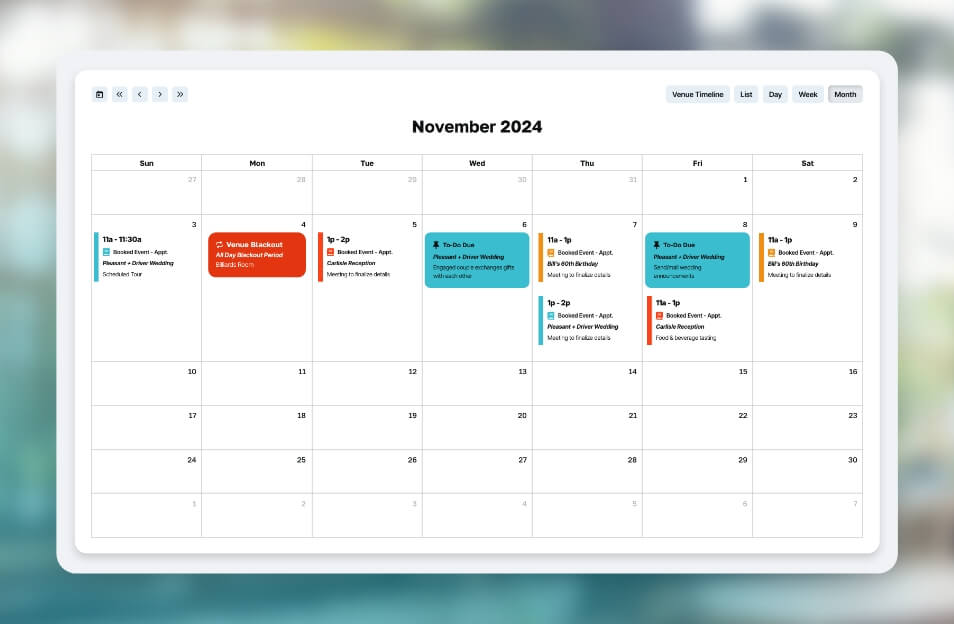
We have simplifieds managing event booking for spaces and rooms so you can quickly scan your calendar for availability, enter an event, and be confident that no space or time has been double booked. Our business center software offers at-a-glance, color-coded calendars with event and venue views that can be synced to other electronic calendars like Google or Outlook.
Keep your contact information and communications history in one place for all your clients, tenants, prospects, vendors and contractors with our event facility CRM tool. Perfect for sales, marketing, and customer service efforts. Send, receive and monitor all event-related email communications from a central inbox. Track leads as they pass through your pipeline. Keep complete records of client events. Streamline all your processes with custom automations and workflows. And integrate with hundreds of other applications like Gmail, Outlook, Salesforce, Zoho CRM, Quickbooks, Xero, and MailChimp (via Zapier).
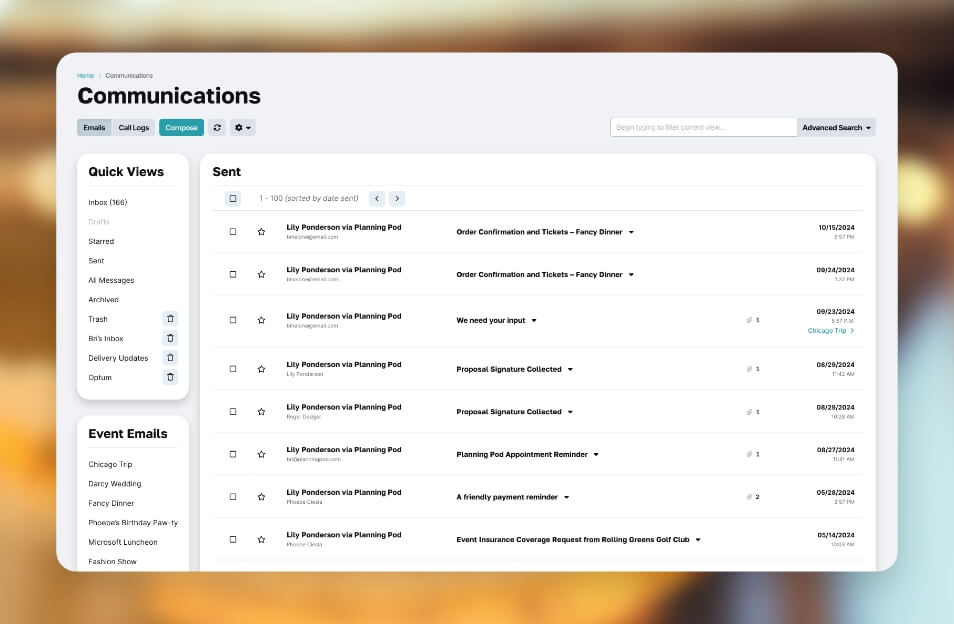
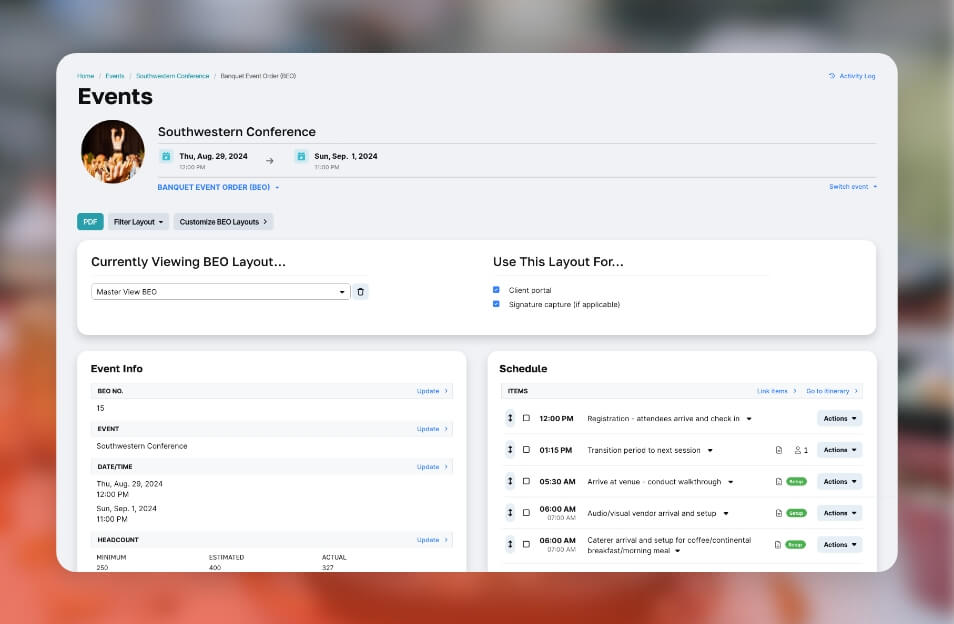
Our conference center software streamlines how you take in and manage event orders every step of the way. Build timesaving templates for packages, rental/service items, full event proposals, and standard contracts. Collect inquiries via web forms and electronic signatures on agreements. Manage food-and-beverage / catering orders and generate banquet event order forms in minutes. Create detailed event invoices with payment schedules and reminders. Collect credit card payments online. And make it easy for clients to view and sign documents, make payments, complete tasks, and more with online client portals.
Get vital insights into your business data with comprehensive event reporting and on-screen dashboards. Download Excel-compatible reports for budgets, facility usage, leads, invoices aging, payments, and more. View in real time what items for your events are complete, upcoming or overdue. Set notifications and reminders for important tasks and deadlines.
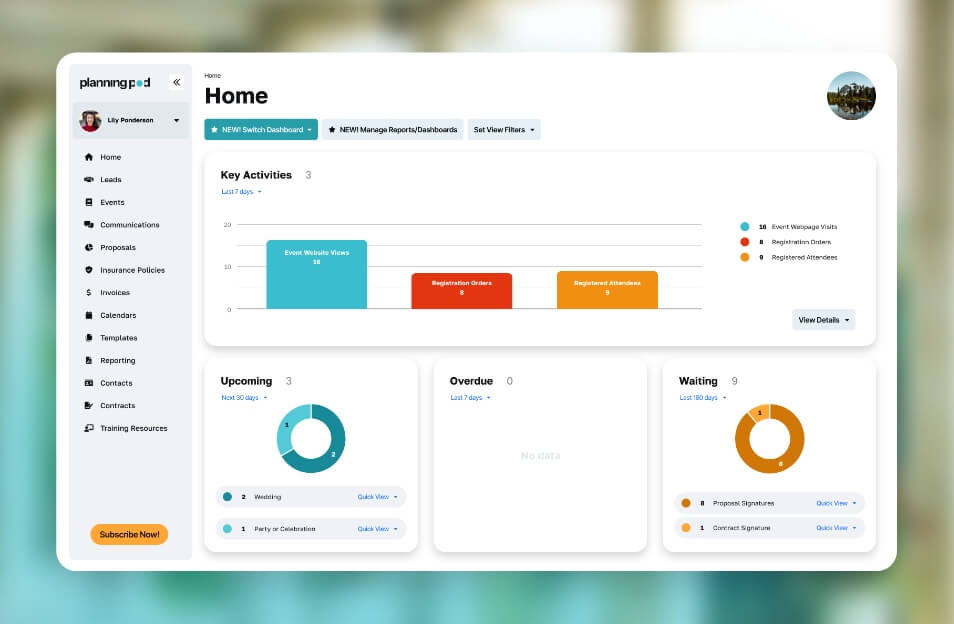
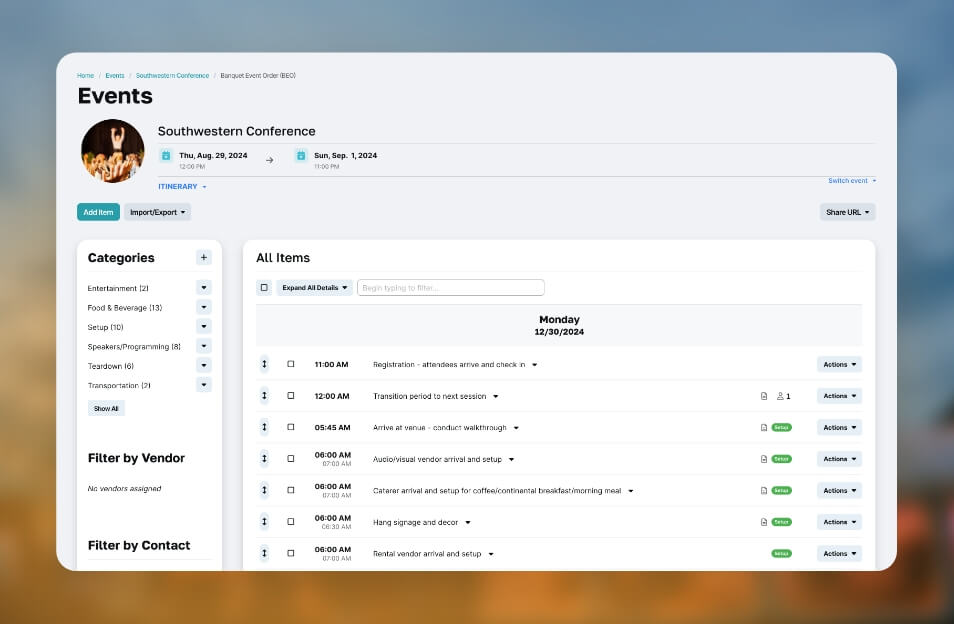
Invite staff members and vendors into your account to collaborate online. Add them to booked events, assign them tasks, and monitor their progress. Track resources like A/V equipment and table setups, catering food-and-beverage, and support personnel allocated to bookings through worksheets. Build detailed event timelines with up-to-the-minute text and email reminders. Store and share setup and teardown documentation.

Before we dive into how to pick the top venue management platform for your facility, let’s take a step back and ask why you would need this kind of technology in the first place.
Generally, your venue could use event facility management software if…
So if you think your facility could use a productivity-and-process boost at this time and are starting to shop for a solution, which one is the right one for you? Well, for starters, not all corporate or event facilities have the same mission, infrastructure, offerings or business goals, and so it’s no coincidence that there is no one-size-fits-all conference center management software platform that works for every venue.
In fact, there is a variety of event center software options, from solutions that focus more on event management and scheduling to offerings that have operations and order management as their sweet spot.
With that said, let’s dive into the nine steps for choosing the conference center software that’s the perfect fit for your needs.
Because there are a number of options available, you should begin your search by creating a wish list of what features and tools will best serve your venue’s needs.
Think of this as the jobs that you need technology to help you accomplish in your business. Do you need an all-in-one venue management system that does dozens and dozens of things? Or is that overkill and you need to focus on a very specific set of capabilities? Wherever you land, you should use this list to guide you in your search, and you should also keep these additional criteria in mind:
Any event facility management software that you choose should improve your facility’s workflow, so first consider what processes you need to improve and look for applications with those tools and how those tools integrate with each other.
Also, look for the ability to collaborate with staff by inviting additional users into the application, setting their usage permissions and sharing tools with them like task managers and calendars.
Any piece of software is going to require some level of adaptation, but you should still make sure that it has enough flexibility where you can configure certain settings, customize it with your venue’s brand and build out things like reusable templates for assets you use repeatedly (like packages, proposals, budgets, task lists, etc.).
Also, whether you manage a conference or convention center, event or retreat center, university or corporate campus, you should make sure the application works well with your type of facility and can handle the types of events you typically book.
What is becoming an increasingly important attribute to look for in conference center software is the ability to integrate with other applications, from video conferencing and HR information systems to platforms like Google, Salesforce, Quickbooks, and Slack. Keep in mind that some applications offer one-off API integrations while others connect to integration platforms like Zapier.
At a minimum, event facility management software should make sure you and your team can easily enter, view, and update your event bookings and room bookings without double-booking events or resources. Ideally, it should also have an event reservations calendar that displays bookings as well as room and space availability so you can quickly see what days and times you need to fill for your facility.
Some platforms may also offer lodging management capabilities; the ability to schedule services (like catering or A/V setup); and run-of-event schedule/timeline builders.
Some facilities only require a simple form for internal clients to request a room reservation. Other venues need an entire lead management through billing apparatus to track all the parameters involved in an event order. Here are a few common features offered by event center software solutions regarding tracking orders:
You are probably already using an accounting software platform or have financials integrated into another software suite you are using (which is normal, as many facilities use 5-10 separate pieces of software already). But you will want to consider how far you want your online conference center software to go and where you want your account software to take over from a functionality standpoint, as many facility management software applications include:
Usually with most event bookings comes allocation of internal and external resources for the booking. These resources can include staff and supplier personnel for oversight, equipment setup and operation, security and room teardown/cleanup as well as inventory allocations, including A/V equipment, tables, chairs, furniture, and other rental equipment and physical assets. You should determine what, if any, of these resources your conference center software of choice will need to help you track.
Additionally, enterprise-level convention center management software suites may include operations and facility maintenance management tools.
Client CRM tools give you the ability not only to store basic contact information for your customers but open up a world of data management and tracking capabilities, not the least of which includes order, payments, and communications history as well as forecasting based on this data. Related capabilities may also include value-add tools you may want to provide to your clients, like event websites; registration, ticketing, and RSVP capabilities; and at-the-door check-in tools.
In addition, event vendor management tools let you assess vendor usage and spend as well as monitor vendor assignments and progress in your current events. Such tools can be used to manage caterers and food services companies; beverage and bar providers; audio-visual rental companies; and transportation providers.
Last but not least, you should determine what kind of reporting and data insights you expect from your event facility management software. Reports can get overwhelming very quickly if the data is not well organized or if there is no summary or interpretation provided, so make sure to run each platform through its paces when running sample reports and assessing the analytics provided. Standard reports can include facility and space utilization, sales, revenues, and accounts aging, but you should also inquire if any customization is provided.
Finally, on-screen dashboards are a great way to get at-a-glance, summary data on which you can base quick decisions or make instant assessments to redirect resources or change course.
© 2025 Copyright Planning Pod. All Rights Reserved.